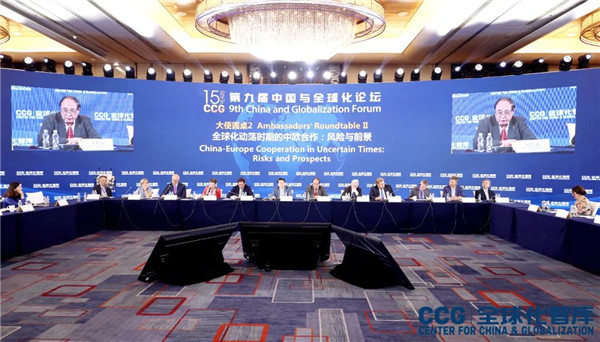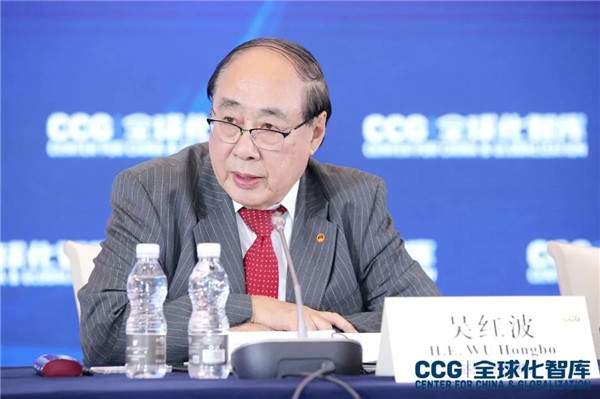Wu Hongbo Responds to Queries at CCG Annual Forum
October 10 , 2023
Wu Hongbo, Special Representative of the Chinese Government on European Affairs, addressed a roundtable of European ambassadors at CCG’s 9th China and Globalization Forum on Sept. 21 in Beijing:
Thank you very much. President Wang. It’s the first time in China, I’m seriously outnumbered at homeground. You can never see this in China, because there’s so many Chinese here, but I’ve been outnumbered by the ambassadors from the European Union, my friends. And secondly, I would like to respond briefly to some of the points raised by the ambassadors, otherwise I would not do the justice to the panel and the ambassadors.
First, the three positioning of, whatever you call it, “descriptions” or “strategies” — that depends which way you look at it. I heard you loud and clear. I understand your points, but unfortunately, I’m not very convinced. So let’s great to disagree.
Let me ask you one question: Do you know the differences between a lawyer and an engineer? I’m saying this, not having the intention to offend anyone. This is a question asked by somebody else to me when I was an ambassador. The answer is: the lawyer making simple things more complicated then charge their clients; engineers are trained to make complex issues simple and solve it. So on this point, I do hope our European ambassadors and EU headquarters will make complex issues simple so that we can move forward with our cooperation.
Secondly, I heard the frequent phrases used by many people “rule-based international order”. In the United Nations in the English language, we always use abbreviations like SDGs, MDGs, and so on. I’ve no objection, but I need further clarification. By “rules”, you mean the United Nations Charter or the international laws enshrined in the international conventions passed by the General Assembly. If that is the answer, I fully agree with this and support it. My worry is there are some homemade rules which have only binding force on other countries, not themselves. If that is the case, I’m sorry. I will not accept that. Now, derisking. Maybe I did not make myself clear. I’m sorry for that. Decoupling is the baby of USA. Derisking was invented in Europe. Now, we have been talking about derisking, we have different views. But going along with derisking, there’s one thing is worrying: the concept of national security is being overstretched. Take the famous case Huawei, for example. So far, there’s no single country coming out with hard facts that this company is threatening their national security. Even then, they were not given level playground.
Let’s talk about ASML in the Netherlands. We were having normal business buying DUV machines from ASML. And all of a sudden, they changed it for reasons you all know. So this is not normal business — it has been politicized. So we are both against this politicized business and deal; we both want play ground that’s level and treat everybody else as equals; let’s work for that purpose.
Human rights were mentioned almost by each and every ambassador. The human rights derives from the Declaration of Human Rights of the United Nations. I don’t know whether the ambassadors sitting here know why, instead of one covenant, we came out of two. One is civil and political; the other is economic (social) and cultural. Why you got two instead of one? I can tell you ambassadors: at the very beginning, the developed countries and developing countries have differing views. The developed countries saying, if you have your political rights, civil rights, then the social wealth, the cultural will come with these rights. But actually not. And so the United Nations cannot have the two groups brought together. So the General Assembly decided to have two covenants, one on civil and political rights, one on economic, social and cultural rights.
So to emphasize one covenant is not right. We, in China, we support both covenants. We support all the human rights. It’s hard to imagine that the country who spent four decades to pull out as many as 800 million people out of extreme poverty, is at the same time a serious of violator of human rights.

Now, the Ukraine issue has been mentioned by almost all ambassadors, and the China-Russia relations are also involved. I heard you very carefully, and your arguments were repeated to me during my visits to European countries. Let me first say China-Russia relations. We are big neighbors. The neighbors cannot be relocated. Russia is also the European country’s neighbors, and that can also not be relocated. The relations between China and Russia are of no iron lines, no confrontation. China-Russia relations are not directed against any third parties, nor subject to any third parties.
About the Ukraine issue, we have very deep sympathy for the Ukraine people. The Chinese engineer students were the last group of people to be pulled out from that country. We supplied with some humanitarian goods to Ukraine, and we appointed Special Representative, my colleague, the former Vice Minister of MFA, to deal with this issue. And he traveled to countries including Ukraine and also participates in international conventions or meetings.
Well, I think ambassadors, by listening to you, we are not doing enough; we should do more. Let me say this: have you ever considered many countries in the world refuse to take sides? Not because they have no principles, or they do not know anything. I think one of the European Prime ministers, after visiting some countries, tried to convince other countries’ leaders. He said, they are not against our principles, they are against our double standards. So we have been reminded the miserable lives of Ukraine people. Yes, we show sympathy. And do we forget the miserable life of Iraqi people when they were invaded by a permanent member of Security Council without approval of United Nations authority, and how that country was let away easily? So that people, they have a much longer memory. They remember that.
Having said all that, China is, in its own way to push the possibility of a peaceful settlement through diplomatic negotiations. At the very beginning, as mentioned, China made four points. Number one, the sovereignty and territorial integrity of a sovereign country must be respected. The United Nations Charter, and rules and regulations must be abided by. The legitimate concerns of a sovereign state must be given the due regards. And efforts must be encouraged to deescalate the tension. And later on, we published our position paper on Ukraine situation. This is an ongoing process. China is ready to work with the United Nations, with the European Union and other countries to find a solution.
At this moment — I think you know better than me — is not the time for the two parties to sit down for negotiations. That does not mean there will be no opportunity in the future. So that’s not give up our efforts. China will continue to contribute to the possible solution to the crisis in our own way. In doing so, we are ready to listen to you and to others to see if we can do more.
Having said all that, I just want to say I like this panel very much. To have a face-to-face discussions and debates, and sometimes really sharp words, but we do understand each other much better. So thank you very much, ambassadors.
Topical News See more






